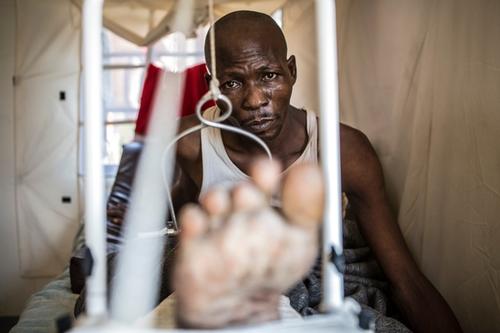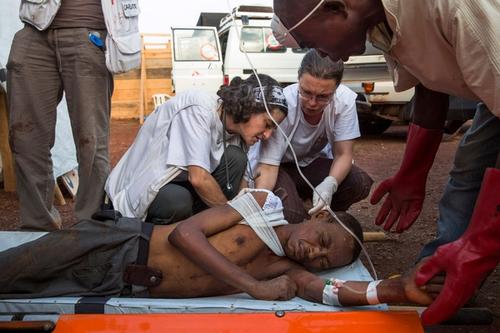Geneva, 18 February 2014 – The extreme levels of violence against civilians and targeted killing of minority groups in the Central African Republic (CAR) illustrates the utter failure of international efforts to protect the population, said the international medical humanitarian organisation Médecins Sans Frontières (MSF). This is a damning indictment of the international response to the crisis and amounts to the effective abandonment of the Central African population.
MSF calls on member states of the UN Security Council, as well as donor countries, to mobilise to immediately halt the atrocities against the population, establish the level of safety needed for people to move freely without fear for their lives; and organise a massive deployment of aid to meet the basic needs of the population. Local and national leaders must do their utmost to stop the violence and enhance protection.
'Sense of helplessness'
“Our foremost concern is protection. We are caught in a sense of helplessness faced with extreme violence, treating thousands of wounded, and seeing hundreds of thousands of people fleeing their homes as it is their only option to avoid being slaughtered,” said Dr Joanne Liu, MSF International President, who recently returned from CAR. “There is a shocking lack of engagement and mobilisation of political leaders in the UN Security Council, and a too limited one from African countries and the African Union to address the violence that is literally tearing apart the Central African Republic.”
Central African civilians of both of the main religious communities are being held hostage to violence instigated by armed groups who bear the primary responsibility for the atrocities. Since December 5, MSF teams have treated over 3600 wounded in the capital and around the country. This includes gunshot, grenade, machete, knife and other violent trauma.
“When I was in Bozoum, we found 17 injured people with wounds from gunshots, machetes, and a grenade, hiding in a small courtyard,” said Dr Liu. “They were too scared to go to the hospital in case they were targeted again. Their injuries were serious -- yet they were all sitting in silence, bleeding. That's how terrified people are of seeking medical care. They just sat there in silence, having lost all hope."
Attacks on hospital grounds
MSF teams are constantly dealing with violent attacks taking place in close proximity to or inside hospitals. For instance on February 12 in Berbérati town, men armed with machetes and guns entered the hospital where MSF is working, firing shots and threatening patients. Two patients fled the hospital, fearing for their lives. On countless other occasions in various locations, local leaders, religious clerics, and MSF medical staff have had to physically intervene in situations in which armed men were attacking or threatening to kill individuals, including sick and wounded patients. Patients are regularly refusing to be transported in ambulances to avoid further abuses. In other cases, general insecurity has made it too risky to take roads.
In eight different places where MSF works, around 15,000 civilians are gathered and trapped in hospitals, churches, or mosques, living in fear of being killed by armed groups. In towns such as Bouar, 6000 Muslims are trapped, fearful of being targeted if they try to leave. MSF has opened health posts in many of these enclaves, including in Bangui, as people are too fearful to go to the hospital even if it is only a few hundred meters away.
Over the past two weeks, MSF teams have seen tens of thousands of people from the Muslim community in Bangui, Baoro, Berbérati, Bocaranga, Bossangoa, Bouca, Bozoum, and Carnot fleeing or being trucked away to neighbouring countries by international armed forces that were, otherwise, incapable of protecting them. Others have been evacuated from the northwest of the country to Bangui and are now trapped in enclaves and camps where they continue to live in terror. Fear of persecution has pushed tens of thousands of civilians from all communities to flee to the bush, without access to any form of protection or humanitarian assistance.

Appalling lack of assistance
The devastating toll of violence has been further compounded by the lack of a meaningful scale up of humanitarian assistance to meet even the most basic needs of the people. Assistance has been appalling in Bangui and practically non-existent outside the capital. From the distribution of water to food and shelter – the absolute basics of aid -- there continue to be lethal deficits. One of the most egregious examples is in Bangui’s Mpoko international airport where around 60,000 internally displaced people are living in abysmal conditions with less than 4 liters of water per person per day and deplorable sanitation, just a few hundred meters from the airport’s runway.
Even though security incidents hamper MSF’s operations on a daily base, the extensive deployment of MSF staff – more than 2,240 international and national staff -- and activities in 16 towns around the country shows it is feasible to provide humanitarian assistance.“The horrific conditions in Mpoko airport raise the question of whether the slow delivery of aid is a form of deliberate neglect aimed at dissuading people from staying there,” said Dr Liu. “People need to be given real choices. In view of the levels of violence in Bangui, they need to be able to choose whether to go home or stay where they feel safe. Assistance should be provided wherever they feel safest.”
“The human crisis we are witnessing today is unprecedented in the Central African Republic, a country that has been neglected for years,” said Dr Liu. “ A mobilization must come now, not in one month, or six months down the line. We see atrocities every day. This is a massive catastrophe unfolding in full view of international leaders. To not respond is a conscious and deliberate choice to abandon the people of the Central African Republic.”
In retaliation for the extreme acts of violence committed by ex-Seleka forces, local self-defense militias known as ‘anti-balaka’ launched collective revenge attacks on Muslim civilians, who they regarded as the Seleka’s potential political base. This has resulted in a frenzy of violence and looting which has in recent weeks mainly targeted Muslim communities, but Christian communities are also still victims.
MSF has been working in Central African Republic since 1997, and now runs eight regular projects in Batangafo, Boguila, Carnot, Kabo, Ndéle, Paoua,Bria and Zémio; and seven emergency projects in Bangui, Bouar, Bangassou, Bozoum, Bossangoa, Bria, Yaloke and Berbérati. MSF has more than 240 international staff and 2,000 local staff working in the country. Additional MSF teams are assisting refugees from CAR in Cameroon, Chad, Democratic Republic of Congo, and Congo-Brazzaville.



